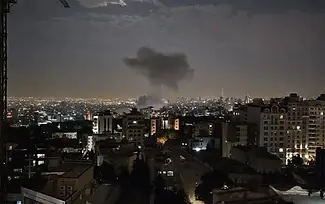
A rescue worker navigates the rubble of a collapsed building following a missile strike, as regional conflict escalates and civilian infrastructure suffers devastating damage. [Photo Credit: AFP]
Egypt suffers the most among African nations from the Iran–Israel missile crisis, as Red Sea disruptions cripple Suez Canal revenue and deepen its economic woes.
Published:
June 16, 2025 at 7:11:35 AM
Modified:
June 16, 2025 at 7:17:26 AM
As geopolitical tensions in the Middle East escalate, Egypt finds itself at the epicenter of economic aftershocks reverberating across Africa. The missile exchanges between Iran and Israel, along with associated unrest in the Red Sea, have triggered severe consequences for Egypt’s already fragile economy, positioning it as the most affected African nation in this unfolding crisis.
In recent weeks, Egypt's currency, the Egyptian pound, experienced a sharp depreciation, plunging to EGP 50.60 against the U.S. dollar, down from EGP 49.80 just days earlier. This currency slump coincided with a drop in investor confidence, as evidenced by the EGX 30 Index shedding 7.5% in a single week before slightly recovering to a 4.6% decline. The instability is widely attributed to increasing uncertainty over regional security, particularly as vital shipping lanes are threatened.
A major source of Egypt’s economic woes lies in the disruption of Suez Canal operations, one of the country's largest sources of foreign currency revenue. With commercial shipping increasingly avoiding the Red Sea route due to Houthi rebel attacks on vessels, Egypt has seen a steep decline in Suez Canal traffic.
Analysts estimate that the country could lose between $4 billion to $5 billion annually, translating to a 40–50% drop in canal income. This loss comes at a critical time when Egypt is grappling with high public debt, a widening fiscal deficit, and dwindling foreign reserves.
The consequences extend beyond shipping. Tourism, another key pillar of Egypt’s economy, is beginning to show signs of stress. Ongoing instability in the region is deterring international visitors, many of whom perceive proximity to conflict zones as a risk. This, in turn, puts additional strain on employment, small businesses, and foreign exchange earnings in tourism-reliant regions such as Luxor, Aswan, and Sharm El-Sheikh.
Insurance premiums for vessels passing through the Red Sea have surged, prompting more global shipping companies to redirect their cargo around the Cape of Good Hope. This alternative is not only longer and more expensive but also strips Egypt of vital toll revenues. The compounded loss of trade and tourism revenues, coupled with increasing import costs due to a weaker pound, could shrink Egypt’s GDP by an estimated 1.6% to 5.2%, according to regional analysts.
Already under pressure from high inflation, energy shortages, and a tight foreign exchange market, the Egyptian government may be forced to consider emergency measures, including potential IMF negotiations, public spending cuts, or subsidies reform to stabilize its economy.
Egypt’s geographical location at the crossroads of Africa, Asia, and the Middle East, typically a strategic advantage—has now made it uniquely vulnerable to external shocks. With global powers watching the region closely and economic pressures mounting at home, the Egyptian leadership faces an urgent challenge: navigating a deepening crisis without tipping into further socio-economic instability.
Keep Reading

